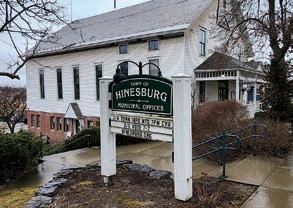




LIBERTY DARR STAFF WRITER
Two Charlotte residents have asked the selectboard to remove Charles Russell as development review board chair, citing a pervasive hostile environment and “professional misconduct” at meetings.
During a special selectboard meeting last week, board members spent an hour in executive session reviewing the complaints, and ultimately decided to tap the Vermont League of Cities and Towns for advice.
“We feel that since this is a relatively new situation with the town of Charlotte, we should seek outside advice,” selectboard member Kelly Devine said. “Because not only do we want to be able to deal with this current situation fairly, but we also want to be sure to have a process in place should this happen again.”
She emphasized that the selectboard takes the matter seriously,
See RUSSELL on page 16
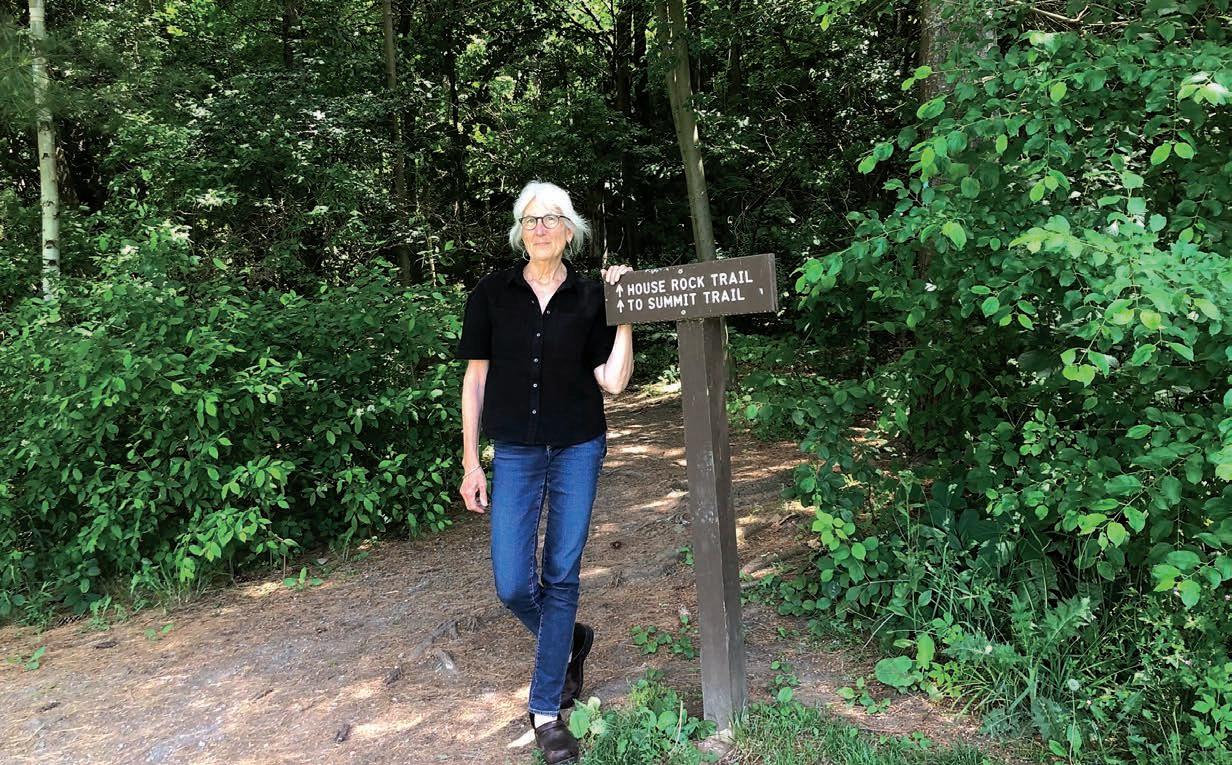
LIBERTY DARR STAFF WRITER
For freelance writer and unofficial historian Judy Chaves, the 968-foot climb to the summit of Mt. Philo has been a meditative practice for most of her adult life.
Walking five days a week up

and down one of the state’s most popular hiking spots can really begin to reveal the working landscape of a place, while also simultaneously revealing a lot about people in general.
“I’ve hiked here with just about everybody in my life. I’ve got a close friend, we meet here
at least every other week, and we just yak our way up and yak our way down. We hardly even know we’re hiking. And that’s true for so many people,” she said.
Chaves was in graduate school some 30 years ago the first time she visited Mt. Philo State Park in Charlotte, and she’s just never
stopped visiting. For her, Mt. Philo, and the experience it brings, is personal. So personal that her love of the mountain began a decade-long effort to unravel the history behind one of Vermont’s

most beloved peaks. That work is the basis for her book, “Secrets of Mount Philo: A Guide to the History of Vermont’s First State Park.”
The story, as told by Chaves, is one that began 100 years ago this year with a single act of generosity. The prevailing message, she said, is that this state’s beloved mountain is proof that just one action can have a lasting effect for years to come.
“To me, it’s an example of foresight and that way of loving a place by giving it to the public. That to me is a remarkable aspect,” she said, sitting at a picnic table that rests at the entrance of the park. “It’s a real lesson that this place has for us. It’s not just something that should just stay in the past but needs to continue.”
Her historical treasure hunt began simply by noticing changes on the mountain that, to any passersby, would appear insignificant. Like, for example, when state park officials began replacing the metal iron railing at the summit with a chain link fence.
“I went up and they were ripping out the old iron railings at the main viewpoint, and they replaced them with a chain link fence that I thought was inappropriate for this beautiful park. A chain link fence, I think of as sort of urban,” she said.
Through some early research, she found that this metal railing, installed in 1902, was exactly one of the reasons the mountain was placed on the National Registry of Historic Places. Through some dedicated campaigning on the part of Chaves, officials ultimately resorted to replacing the chain-link fence with a replica of the original railing.
“That got me going on the whole history of the park. Reading the nomination papers for the National Register was full of absolutely fascinating information. I just then got a little bit obsessed,” she laughed.
Through a decade of research, she’s found that the mountain’s history is really just a microcosm of the history of the entire state of Vermont — Indigenous people hunting and gathering the land; the first European settlement in 1786 and a Connecticut-born farmer who settled at the base of the mountain; the 19th-century Merino “sheep fever” craze; and the earliest inceptions of Vermont’s agritourism economy.
“Everything that happened on Mount Philo is a little miniature version of what happened throughout the entire Northeast,” she said.
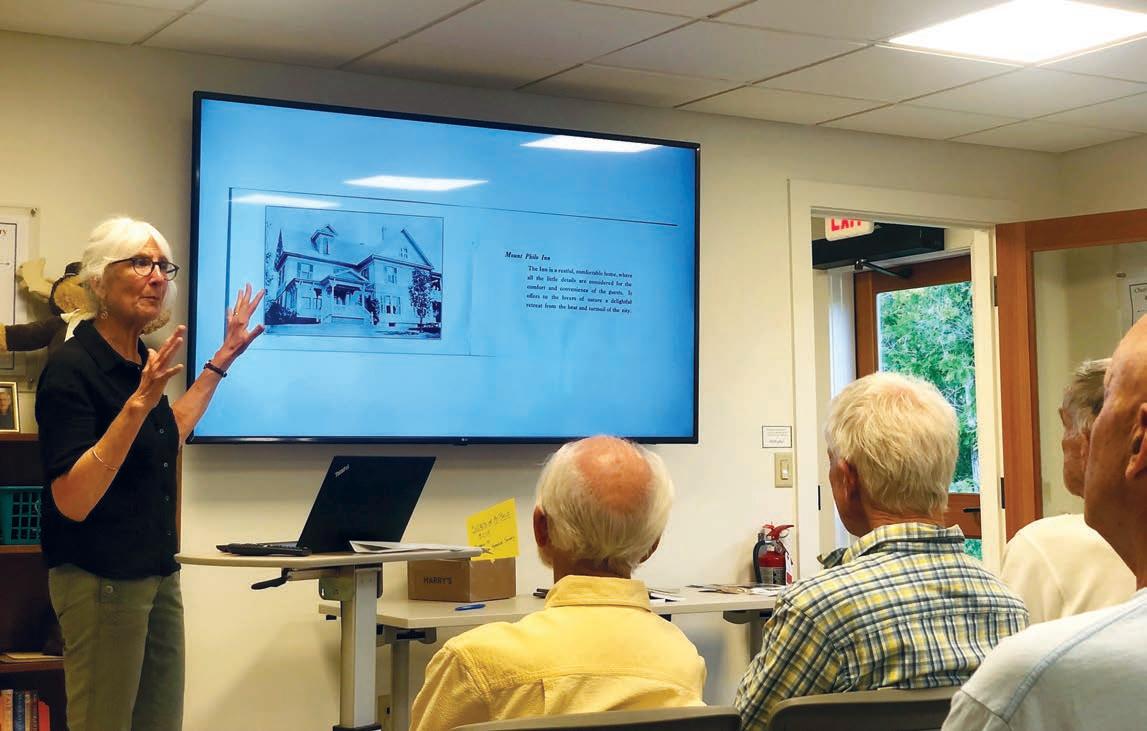
According to her research, the landscape of the mountain would have looked much different than it does now, and early photos and postcards show most of the mountain completely void of the lush vegetation that inhabits it now, mostly due to deforestation and the rise of the forestry industry, she said.
As landscapes changed and time passed, sheep were soon replaced with dairy cows and the start of Vermont’s burgeoning dairy industry.
Vermont was marketing itself as a place to come and have a farm life.”
“Everything that happened on Mount Philo is a little miniature version of what happened throughout the entire Northeast.”
“One of the ways that dairy farmers could pad their income was to open up their farm in the summer to tourists,” she said. “This was the middle to late 19th century, and wealthy urbanites would come up from Boston and New York and spend part of the summer up north.

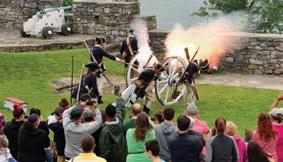
The Mount Philo Inn, a byproduct of this exact type of agritourism, began when farmer Frank Lewis converted his 1880s farmhouse to accommodate more guests. Two regular Vermont vacationers from Massachusetts, James and Frances Humphreys, fell so deeply in love with the experience that they began buying land and would continue to visit Vermont summer after summer.
Judy Chaves
After James died in 1924, Frances gifted the land that is now known as Mt. Philo to the state, thus creating Vermont’s first state park.
money. If the people of Vermont appreciate the privilege of riding up Mt. Philo or walks through its paths, that is all that is asked by its honor,” Frances Humphrey wrote of the mountain in 1924.
Chaves has spent a good amount of time since finishing the book hosting book talks and guided hikes to the peak, pointing out other historical facts like where the original Carriage Road would have been and how the mountain has changed over the years.
While Chaves recounts often the generosity of Frances that began the state’s park system, the work she has done to compile centuries of history marks a new era of Mt. Philo’s story, 100 years later.
Although she has no plans to continue her historic pursuits, there are still certain mysteries that encompass the mountain, like where exactly it got its name. Many speculate, but no one quite knows for sure, she said.
And that mystery — and others — is exactly what keeps Chaves coming back.




School is out, temperatures are rising; time to cool off and slow down.


LIBERTY DARR STAFF WRITER
A controversial zoning regulation proposal that’s been in the works for over a year has had Hinesburg residents and town staff divided on how the town should move forward. Now even selectboard members are split on exactly what to do.
Following a selectboard public hearing earlier this month, the board had the option to either accept and adopt the regulations as proposed by the planning commission or kick them back to the eight-member group for more work.
But at a selectboard meeting last week, the board chose to do neither as members couldn’t quite yet come to a consensus on the best path forward.
Changes to the Rural Residential 1 district designation — an area that extends from the village growth area to the town’s northern border near Mt. Pritchard — have been in the works since 2021 and were revised and finalized by the planning commission in December last year.
The specific proposal, as outlined in the town plan, makes changes to the regulations to better reflect different land forms, patterns of development and land use priorities, Alex Weinhagen, the town’s director of planning and zoning, said.
That zone for years has been characterized by town officials and planners as having a “one-size-fitsall” approach to zoning in a district characterized by diverse settlement patterns and natural resources.
Under the plan, the Rural
Residential 1 district would be sectioned off three ways: the Richmond Road corridor, an area just above the village growth area that is served by municipal water and sewer — and the most densely populated portion of town — would be changed to the Residential 3 district, allowing one home per acre.
The Residential 4 district would then extend above that area and would allow one home per 3 acres and act as a transitional zoning district between the village growth area and the more rural districts.
But the greatest distinction, and where most of the controversy lies, is the newly proposed Rural 1 district — which would encompass large portions of land to the north and east of Hinesburg’s downtown.
Limitations on subdivision and density requirements in this new zoning district would mirror the town’s Rural Residential 2 and agricultural districts — which occupy nearly 80 percent of Hinesburg — with only one home per 10, 12 or 15 acres based on the quality of the public road that provides access, while also adding other layers of design review that have historically only been applied to Hinesburg’s most rural areas.
But the proposed change to Rural 1 has raised the ire of landowners in the past year who vehemently oppose the proposal, saying that the changes devalue their land and infringe on their property rights.
Although the proposal would technically benefit selectboard member Dennis Place — he owns land in a portion of the Rural 1 district — he said he would vote no on the proposed changes as they

currently stand.
“I’m going to vote against it because I don’t like what it’s doing to my neighbors that have owned land for years and years with those rules in place,” he said.
Selectboard chair Merrily Lovell, on the other hand, showed overwhelming support for the planning commission and endorses the proposed changes “100 percent.”
“I support the planning commission and I think the RR1 zoning changes are really well thought out,” she said. “It’s a courageous move, as some people have said, to change the zoning that was there previously to more accurately fit the topography and the housing that’s already there. I think it’s a really well thought out, well worded amendment to the zoning and I support it just the way it is.”
For two selectboard members, Paul Lamberson and vice chair Maggie Gordon, the question was
not clear, specifically as they relate to the Laster property.
The 102-acre property on Mechanicsville Road was purchased by Joe Laster in 2020. The property is split by a district line with the western portion of it in the Residential 1 district known as the village growth area, and the eastern portion — approximately 67 acres — in the Rural Residential 1 district. A master plan for the western portion to include 16 units on 9 acres in that eastern portion was approved in 2021.
Phase one of the master plan was approved in 2022, and work on the first section of road began last month, and the new zoning proposals would bring unique challenges to his plans, which have already been approved.
A request, endorsed by Weinhagen, to extend the Residential 1 boundary line to include these 9 acres of property and would allow
his plan to remain as is, was ultimately voted down by the planning commission.
“I have discomfort around specifically the change that was not made to the Laster property,” Gordon said. “It seems extremely short-sighted to me not to make that entire property fall within the Residential 1 zoning area, so I’m uncomfortable with that section.”
Lamberson expressed similar sentiments and said he wants to see the Laster property remain as it’s been proposed.
Board member Mike Loner recused himself from the recent zoning discussions as he works in real estate and is working with Laster on this project.
The board ultimately decided last Monday night to continue discussion at its July meeting in hopes of finding a compromise that would allow them to take a majority vote.


Total incidents: 41
Traffic stops: 12
Arrests: 0
June 18 at 8:36 a.m., officers responded to a two-car motor vehicle crash on Hollow Road.
June 18 at 3:20 p.m., an officer responded to a single-car motor vehicle crash on Mead Farm Road.
June 19 at 12:32 p.m., theft of property on Ballard’s Corner Road was reported and investigated.
June 19 at 8:03 p.m., found property was turned into the police department and later returned to its owner.
June 20 at 12:15 p.m., an officer assisted another agency with an investigation on Buck Hill East.
June 20 at 9:58 p.m., suspicious activity on North Road was investigated.
June 21 at 8:30 p.m., an individual was trespassed from a business on Route 116.
June 21 at 9:25 p.m., suspicious activity on Commerce Street was investigated.
June 23 at 1:51 p.m., an officer assisted a motorist with a disabled vehicle on Mechanicsville Road.
June 24 at 10:37 a.m., a late reported two-car motor vehicle crash at CVU was reported and investigated.
Note: Charges filed by police are subject to review by the Chittenden County State’s Attorney Office and can be amended or dropped.
A woman was killed June 11 in a motorcycle crash on Webster Road around 8 p.m.
Shelburne police said Jennifer Mayhew, 43, of Shelburne, was preparing to merge onto Shelburne Road when she failed to negotiate a curve and struck a pole.
Rev. Devon Thomas
In my pastoral opinion, the lawsuit filed against the Vermont Department of Children and Families by the Alliance Defending Freedom does not represent Christian values. This suit is a symptom of a very harmful historical alliance between conservative faith and political power.
As a person of faith, I would not want the actions of the alliance to be confused with traditional Christian values. The way Christian faith has been used over the years to repress individual freedom and to ignore the pain and struggle of LGBTQ people is not representative of the gospel at all.
challenge the Alliance Defending Freedom’s position that traditional Christianity sees LGBTQ people as sinners. I would put forward a counterargument that the gospel condemns that very type of dogmatism as a sin against God.
Matthew 19:1-5 is a passage of scripture many dogmatic Christians use to justify heterosexual marriage. It is also the passage where Jesus challenges the social stigma against eunuchs and affirms their place in God’s realm.
always be circumstantial. The idea that the Bible condemns LGBTQ people as sinful is rooted in uncompromising belief that keeps Christians from seeing they are wrong.
That hardness of heart keeps the children of God from the love of God. It kills when we are told to heal (Mark 3:4). It is not traditional Christianity.
Christians do not need to agree with individuals to love and support them. If a person’s beliefs disallow them to support all types of children, then it is the Department of Children and Families’ responsibility to deny their foster status. The department’s primary responsibility is the well-being of the children in its care.
The crash remains under investigation and anyone with information is asked to contact Shelburne police at 802-985-8051.
Shelburne fire and rescue also responded to the scene, with assistance from officers from South Burlington.
Despite lifesaving efforts of bystanders and first responders, Mayhew was pronounced dead at the scene, police say.
Serving the community of Charlotte & Hinesburg A publication of Vermont Community Newspaper Group LLC thecitizenvt.com
Advertising Wendy Ewing wendy@shelburnenews.com (802) 985-3091 x12
Advertising Director Judy Kearns judy@otherpapersbvt.com (802) 864-6670 x21
News Editor Tommy Gardner
Staff Writers
Aaron Calvin Liberty Darr
Production Manager Stephanie Manning stephanie@shelburnenews.com
Editor/Publisher Gregory Popa gpopa@stowereporter.com
Billing inquiries Leslie Lafountain leslie@stowereporter.com (802) 253-2101
Advertising submission deadline: Friday at 5 p.m. advertising@thecitizenvt.com classifieds@thecitizenvt.com
Editorial submission deadline: Friday at 5 p.m. news@thecitizenvt.com
Calendar submission deadline: Friday at 12 p.m. news@thecitizenvt.com
Contact: 1340 Williston Road South Burlington, VT 05403 (802) 985-3091
I fully support religious freedom in this country, but there is a difference between having the freedom to express religious beliefs and imposing them upon others. This is the reason the Vermont Department of Children and Families has chosen to revoke the foster care license of a Vermont couple who, by their admission, hold religious beliefs that keep them from recognizing the difficulties many LGBTQ youth struggle within Vermont.
I don’t want to argue the department’s case, which should be left to the courts, but rather to
In this passage, Jesus rebukes his disciples for discouraging children from hearing him. He tells them, “Let the children come to me and do not stop them, for it is to such as these that the kingdom of heaven belongs.” Here, Jesus does not distinguish between who God’s children are. Jesus warns against sin but is always aware that what is wrong, and right is circumstantial. He tells us the law does not define sin, hate defines sin. Jesus clearly warns his followers to avoid dogmatic beliefs, telling them not to get so hung up on laws and codes that they cannot love other people. Doing so is a greater sin.
I accept there are many interpretations of how best to love God and neighbor. However, I reject, with full faith, that any human being or written document can communicate the fullness of God’s will. Good and evil will
I do not believe the Alliance Defending Freedom case reflects the message of Jesus Christ. I would further argue that the dogmatic teachings they believe to be traditionally Christian are a deviation from the message we see in the gospel. We are all entitled to our beliefs and opinions, and I would hope those who choose to inform themselves on what traditional Christianity has to say about our LGBTQ sisters and brothers, choose to read the gospel message for themselves.
Rev. Devon Thomas serves the Ascension Lutheran Church in South Burlington.

Please don’t tell me your dreams. It’s not just that they bore me, they anesthetize me. I’ll be out before you explain, “It’s me in the dream, but not really me, you know?”
I do understand that, for many, dreams are informative, revelatory and profound. But after 12 years of Jungian dream therapy gone awry, I just can’t listen to them anymore. I’m ridiculously happy ignoring even my own dreams. See? It’s not personal.
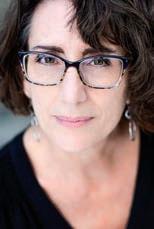
So, it was shocking when I awoke with a dream that I not only remembered but, horrors, wanted to share with someone. Dear reader, that means you. Don’t worry, I’ll pay it forward. For everyone who reads this, I’ll listen to an equal amount of my husband’s dreams. I didn’t say I had to be awake, right?
My dream was no big shakes. Nothing epic about it. In it, my brother, Roger, tries to convince me to go on “The Amazing Race” with him. If you’re not familiar with this reality TV show that boasts 36 seasons, let me fill you in. Pairs race around the globe performing unexpected challenges like bungee jumping into the Corinth Canal or riding a yak in Mongolia. Yes, sometimes the competitions are less thrilling, like pushing fish heads on spikes or eating four pounds of meat or running in your underwear.
In real life, there is no way Roger would want to go on this show, with me or without me. We have this in common. I’m so sure about this, I’d rather listen to your dreams than go on “The Amazing Race.”
In the nightmare, I mean, dream, I beseech my brother, “On what planet do you think we’d want to do this?” I go red in embarrassment as I imagine the possibility

of the show filming both of us crying while one pushes the other down the world’s longest waterslide in Dubai. (If you’re an “Amazing Race” fan, you’ll know the reference.)
Granted, my brother would be fairly good in many of the challenges. I’d like to guess he could put away a solid amount of meat and do fairly well in the underwear running department, though I wouldn’t want to be there to see it. But then I looked closer at the details. The underpants running happens in freezing Siberia and the meat challenge wasn’t just a pile of hamburgers. It was an Argentine feast featuring cow intestines and various glands.
Emphatically, my brother and I do not enjoy surprise challenges. We have zero interest in jumping off a dam or into a boat filled with 500 live crabs, let alone milking a camel. That’s not how we roll.
Roger and I prefer the known, the calm, the predictability of life. Truth is, it’s a remedy to our painful past. Besides, I’d suggest the two of us have already run a sad version of “The Amazing Race” growing up. One that happened to live in our childhood home, where there were enough challenges, precariousness, and fear to last both our lifetimes.
Of course, as children, we weren’t asked to perform death defying feats. Or were we? In an abusive home, you’re forced to play a risky game of survival. Sure, racing around the world would’ve been preferred, but that wasn’t an option.
Instead, our reality competition was at home where we tried to stay as safe as possible. Day after day.
I wish Roger and I could have gone on the real show instead. After all, it offered something we never had a chance at while growing up — the possibility of a win. That, and we’d be a team, finally forging the innate sibling bond we were denied as kids. The one we’ve had to paste together ever since. From the start, I would have Roger’s back. And he’d have mine.
Carole Vasta Folley is an award-winning columnist and playwright. Visit carolevf.com








Guest Perspective
Dean Pineles
At dawn on June 22, 1984, 90 police officers, 50 social workers, medical personnel and numerous state officials descended upon the reclusive and secretive Northeast Kingdom Community Church in Island Pond, initiating one of the most notorious events in state history.
The Northeast Kingdom Community Church consisted of adults and children who moved to Island Pond in the late 1970s from Tennessee. Adults did not register births and deaths, did not send their children to school and allegedly disciplined their children harshly and repeatedly with wooden rods, causing welts, bruises and even open wounds, as dictated by their strict interpretation of the Bible.
The intervention’s goal was to place all the children into emergency state custody and have them physically examined since church elders repeatedly refused to cooperate with the state.
Thus, a clash between two valued rights ensued: the right of children to be safe and the right to freely exercise religion. It ultimately presented an extremely difficult decision for Republican Gov. Richard Snelling. Should the state intervene with a show of strength after all less intrusive measures had been exhausted?
At the time, I was the governor’s legal counsel and his liaison with the attorney general’s office, state police, human services, child protection, health and social services, all of which were involved.
Abuse allegations surfaced in 1982 and into 1983, mostly from defectors. Juvenile court proceedings in Caledonia County proved unsuccessful because the children could never be located within the secretive community.
In September 1983, an extensive state investigation identified 18 abused children. According to one report, “Between 12/82 and 3/83 witness observed parents and two others repeatedly beat [child] with rod resulting in welts and bruises on
buttocks, back and sides of legs.”
The child was 2 years old. All other examples were similar, but again the children couldn’t be located.
In October 1983, an evaluation by a respected Burlington psychologist retained by the office of child protection, concluded: “I feel strongly that all of the children residing in the Island Pond community can be considered at risk for physical and emotional abuse.”
Based on this stark conclusion, plans for an intervention were developed, including the formation of an operational team. But Snelling insisted on voluntary compliance, so over the ensuing months there were repeated personal contacts with church elders, all without success.
On Feb. 1, 1984, an evaluation of a
ity, obtained a judicial warrant to take all the children into custody. But Snelling refused to execute the warrant, insisting that it was his decision to make, and only through the attorney general’s office.
Shortly thereafter, reliable information disclosed a secret plan to relocate the children away from Island Pond. Upon the urgent and unanimous recommendation of the involved state officials, Snelling made the agonizing decision to seek the warrant, which was issued by Judge Joseph Wolchik on June 21.
Early the next morning, the operational team moved in, and state troopers knocked on the doors of 20 church residences and removed no fewer than 112 children.
When they were delivered by buses to Newport for medical and social checkups
The event created a media firestorm, both locally and nationally, and there were headlines, front-page stories and photographs in papers such as the Boston Herald, New York Times, Boston Globe, Burlington Free Press and the Times Argus and Rutland Herald.
4-year-old girl who had been relocated to Florida, concluded, “It is the impression of this examiner (a medical doctor) that the child has been chronically and repeatedly (abused).
There was also an unsuccessful attempt to obtain voluntary examinations by a Maine physician who had a relationship with the Northeast Kingdom Community Church.
Nineteen days later, another evaluation commissioned by the health department concluded: “We think you do have sufficient grounds to consider a screen of all children in the group,” although they urged a cooperative approach. More unsuccessful efforts to gain cooperation were then undertaken into the spring of 1984.
In early June, there was another failed court proceeding in Caledonia County to obtain the identities of certain children.
On June 9, the Orleans County State’s Attorney, acting on his own legal author-
and court proceedings, a different judge, Frank Mahady, had been handpicked by the chief administrative judge, a former Democratic lieutenant governor and political foe of Snelling’s, to replace Wolchik.
It was a day of chaos and high anxiety in Newport. Case by case, Mahady refused to order emergency detention for any of the children, claiming the evidence did not constitute an emergency, and that Wolchik’s warrant was unconstitutionally broad.
The children were never examined and were released back to their parents that day.
The event created a media firestorm, both locally and nationally, and there were headlines, front-page stories and photographs in papers such as the Boston Herald, New York Times, Boston Globe, Burlington Free Press and the Times Argus and Rutland Herald.
Many commentators supported the intervention, but many vehemently
opposed it. State officials argued vigorously that the constitutional rights of small children and not those of religious extremists were of utmost importance. Snelling defended the action, but conceded it was the most difficult decision in his public life. Former Gov. Howard Dean, then a state representative, also voiced strong support.
The debate continued throughout the summer of 1984. The appointment of Mahady proved highly controversial. Many believed Wolchik would have granted emergency detention had it not been for the intrusion of the administrative judge.
There was ongoing litigation in juvenile court on a non-emergency basis to address the underlying allegations of abuse, and Mahady dismissed all the cases in early August. The state did not appeal, ending legal proceedings, and there was no legislative investigation, which some had recommended.
The controversy slowly died down, and despite ongoing efforts by child protection officials, the children were never examined. The church departed Island Pond several years later.
The fundamental dilemma lingers: What was the proper response? If a child had been seriously injured or died from a beating, the state would have been severely criticized for taking no action, just as it was taken to task by many for pursuing the intervention.
It was a classic situation then of “damned if you do, damned if you don’t,” and remains so today.
Retired judge Dean Pineles of Stowe was Gov. Richard Snelling’s legal counsel in 1984 and directly involved in planning the raid to rescue allegedly abused children from the secretive Northeast Kingdom Community Church in Island Pond. The raid generated enormous publicity, both locally, regionally and nationally and was highly controversial. He is also the author of a memoir, “A Judge’s Odyssey: From Vermont to Russia, Kazakhstan and Georgia, Then on to War Crimes and Organ Trafficking in Kosovo.”

A new exhibit at the Lake Champlain Maritime Museum showcases canal boat stories from a fresh perspective.
The exhibit dives into the history of canal boats on Champlain using research and artifacts recovered from shipwrecks and shares lesser-known local stories of canal boats and the people who worked them, providing unexpected points of connection.
“Underwater Archaeology: Diving into the Stories of People and Canal Boats on Lake Champlain” opens Saturday, July 13, at the museum in Vergennes.
While the maritime industry of the 19th century was dominated by men, the canal boat community was strikingly different. Boats were often owned and operated by families who lived on board, combining work and home for men, women and children, and building connected communities with other canal boat families.
For the museum’s research and archaeology team, the work of excavating canal boat shipwrecks in Lake Champlain is a special experience as they discover families’ home goods, toys, tools and clothes as well as the cargo that canal boats were tasked with delivering.
The new exhibit invites visitors to immerse themselves in these stories and experience being an underwater archaeologist diving on a shipwreck to recover artifacts. Using 3D models of original artifacts, visitors can experience what it’s like to find an object in dark water, guessing what it is by touch alone.
Through audio recordings of interviews with two women who grew up on canal boats, visitors can listen to first-person accounts

of what life was like for children on these vessels, going to school in the winter, recreation, and more.
A rich collection of objects including artifacts recovered from shipwrecks, ship models and documents welcomes guests to envision life on board for the diverse mix of people who lived and worked on canal boats.
Featured artifacts include a



toy boat and woman’s overshoe recovered from the sailing canal boat General Butler shipwreck, an iron kettle from the canal boat Vergennes, a 19th-century cornet
from the sailing canal boat O.J. Walker and more.
The public can enjoy a special preview at the museum’s annual summer party on Friday, July 12, an evening filled with live music, local food, a raffle and silent auction and after-hours access to exhibits. Find out more at lcmm.org.
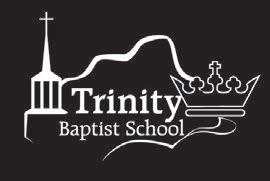



The Vermont Dance Alliance, a statewide arts service organization supporting the Vermont dance community, is accepting applications for a new paid residency program for Vermont choreographers.
The alliance launched a pilot of the residency in January with choreographer Millie Heckler, a Vermont artist who merges movement, voice and original music to tell stories of empowerment. She currently teaches improvisation at the Women’s Correctional Facility in South Burlington. She danced for Charles O. Anderson/dance theater X and was a principal dancer for Rennie Harris Grass Roots Project and has assisted with dance projects for Alvin Ailey American Dance
The Age Well meal pickup for Wednesday, July 10, is from 10 to 11 a.m. at the Charlotte Senior Center. The meal features glazed chopped pork and ham patty with pineapple sauce, mashed sweet potatoes, green beans, wheat roll, oatmeal craisin cookie and milk.
You must pre-register by the prior Monday at 802-425-6345 or meals@charlotteseniorcentervt. org. The suggested donation is $5. Check the website for last-minute cancellations at bit.ly/3FfyLMb.
The meal for Wednesday, July 17, features chopped beef steak with mushroom gravy, mashed potatoes, broccoli, wheat roll, pumpkin cookie, and milk.
Telecom company gives out annual scholarships
Waitsfield and Champlain Valley Telecom have announced the recipients of their 2024 Eunice B. Farr Incentive Award scholarships. This year’s recipients included:
• Champlain Valley Union High School, Molly Dubois
• Harwood Union High School, Melanie Snell
• Mount Abraham Union High School, Shelby Barlett
• Mount Mansfield Union High School, Lila Brillhart
• Middlebury Union High School, Julian Cottell
Theater and the Bates Dance Festival, among others.
During her residency, Heckler created a new evening-length dance theater work that explores the sensuality of rage.
“I am deeply humbled to receive this incredible opportunity of creation. During a time of chaos, uncertainty and healing, the arts provide us air to breathe,” she said.
Heckler’s new work premiered at the Main Street Landing Black Box Theater in Burlington June 21 and 22 and will tour throughout Vermont.
Each residency comes with $30,000. The application period is open until July 15.
Find more at vermontdance. org.
• Vergennes High School, Kaelin Sullivan
Each year, Waitsfield and Champlain Valley Telecom awards six scholarships, one to each of the public high schools that students from our service area attend. These scholarships are donated in memory of the late Eunice B. Farr, former owner and operator of the Waitsfield-Fayston Telephone Company and grandmother of Eric Haskin.
Junapr named an Inc. Best Workplace for 2024
Junapr has been named to Inc.’s annual Best Workplaces list for the second consecutive year.
The list results from a comprehensive measurement of American companies that have created “exceptional workplaces and company cultures, whether in a physical or virtual facility.”
“It’s humbling to make this list for the second year,” Nicole Junas Ravlin, CEO of Junapr said.
Junapr, a communication and corporate event management firm, is one of two Vermont businesses to make the 2024 list.
After collecting data from thousands of submissions, Inc. selected 543 honorees this year. Each nominated company participated in an employee survey conducted by Quantum Workplace, which included topics such as management effectiveness, perks, fostering employee growth

and overall company culture. The organization’s benefits were also audited to determine the overall score and ranking.
up now for Shelburne grab and go meal
Age Well and St. Catherine’s of Siena Parish in Shelburne are
teaming up to provide a meal to go for anyone age 60 and older on Tuesday, July 9. Meals will be available for pick up in the parking lot at 72 Church St. from 11 a.m. until noon and are available for anyone 60 or older. Suggested donation is $5.
The menu is glazed chopped
pork and ham patty with pineapple sauce, mashed sweet potatoes, green beans, wheat roll, oatmeal craisin cookie and milk.
To order a meal contact Kathleen at agewellstcath@gmail. com or 802-503-1107. Deadline
Ever wonder what people are talking about when they talk about regeneration? Currently applied to fields as diverse as ecology, spirituality, health and economics, regeneration has become a bit of a buzzword of late.
Defined by Merriam-Webster as the “renewal or restoration of a body, bodily part, or biological system,” Don Hall, author of “The Regeneration Handbook: Transform Yourself to Transform the World,” argues that we might come to understand regeneration more broadly as the “act of helping to bring something back to life — ourselves, our communities and, ultimately, the Earth.”
In the face of mounting environmental, economic and social crises, Hall, a longtime activist with the international Transition Towns Movement, observes that “more and more people genuinely want to help bring about a just and regenerative future, but feel overwhelmed or don’t know where to start.”
“Fortunately,” he says, “there are so many things we can do right now to make a real difference, starting wherever we are.”
According to Hall, a regenerative community might look like one where there’s an abundance of small farms and gardens, a vibrant culture and economy powered by sustainable local businesses, solar panels on every rooftop, more bikes than cars, good public transit and plenty of spaces to gather and commune with nature. It would also be a place where people from all walks of life regularly come together to dream, discuss and


design their own destiny.
Hall’s U.S. book tour, the “Regenerative Communities Roadshow,” will be stopping in Charlotte for a presentation, ques-
tion-and-answer period and book signing on Wednesday, July 17, 7 p.m. at the Charlotte Library.
The event is sponsored by Sustainable Charlotte, Transition Town Jericho, Charlotte Energy Committee and Charlotte Library. For more information, visit Hall’s website, evolutionarychange.org.
Hall has served in a variety of capacities throughout the Transition Towns Movement over the past 15 years and is currently training coordinator for the international Transition Network. He holds a Master in Environmental Leadership from Naropa University, and lives in Boulder, Colo. For more information, visit Sustainable Charlotte Vermont at sustainablecharlottevt.org.
COMMUNITY NOTES
continued from page 8
to order is Wednesday, July 3. If this is a first-time order, provide your name, address, phone number and date of birth.
Learn about restaurant tickets to dine at participating restaurants at agewellvt.org.
Local garden expert Charlie Nardozzi will speak at and about Bristol’s Rocky Dale Gardens on Sunday, July 14, from 4-6 p.m.
Take a tour of the display gardens and unique landscape of Rocky Dale under the educated and exuberant guidance of Vermont’s favorite gardener. Nardozzi will discuss plants, garden design and maintenance, including Rocky Dale’s unusual specimen trees that add such distinction to the property.
The tour will be followed with herbal tea and treats and time for questions with Nardozzi and Rocky Dale’s staff.
Tickets for the fundraiser, which benefits Art on Main, a nonprofit, community-supported gallery, are $30 and can be purchased in advance at Art on Main in Bristol or at artonmainvt.com.
be
The Shelburne Players will hold auditions for its fall 2024 production, the world premiere of “Murder at Eight,” on
Monday, June 24, and Tuesday, June 25, from 6-8:30 p.m. with callbacks on Thursday, June 27. Auditions will be held at Trinity Episcopal Church in Shelburne.
A world premiere mystery thriller, “Murder at Eight,” centers around a young widow whose six close friends gather to commemorate the anniversary of her husband’s death. But grief turns to terror when she announces that she has poisoned the guest she believes was responsible for his death, who must confess in front of the other five witnesses by reaching for the antidote before the clock strikes eight.
Show dates are Oct. 5-13. Learn more at shelburneplayers.com.
Vergennes City Band return for summer
Free Vergennes City band concerts run every Monday through Aug. 26, 7-8 p.m., on the green.
So, bring a lawn chair or blanket and watch the show. In case of rain or storms, individual concerts may be cancelled.
The Vergennes City Band is made up of instrumentalists from 12 to 90. Interested in joining? Woodwind, brass and percussionists of all abilities are welcome. Bring a music stand if you have one. Percussionists bring their own snare drum and sticks.
Come to concerts that fit your schedule and arrive at 6:30 p.m. Contact Susan O’Daniel, sodaniel27@gmail.com with questions or interest.













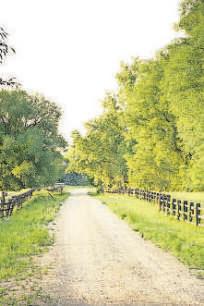





115 Ferry Road, Charlotte. 802-425-3864. Register at charlottepubliclibrary.org or info@ charlottepubliclibrary.org.
More information and links can be found on the library website.
Adventure Monday
Mondays in July, 10-11 a.m.
July 8: Sports on the lawn. July 15: Make a paracord survival bracelet. July 22: Harvest the garden and cooking adventure. July 29: Stories of survival. For ages 7 and above.
Preschool storytime
Tuesdays in July, 10-11 a.m.
Preschool stories, crafts and activities. No registration required. Age 2 and over.
Preschool free play
Wednesdays in July, 10-11 a.m.
Kids explore the sensory table, sorting, playing with blocks, play dough and more. Ages 2 and over.
Thursdays in July, 9:30-10:30 a.m.
Saturday, July 6, 10-11 a.m.
Unstructured hour for parents, caregivers and babies. Explore books and toys and general conversation. Birth to 18 months.
Let’s Lego
Saturdays in July, 10 a.m.-1:30 p.m.
Drop-in play. Loads of Lego bricks with books and prompts for inspiration. For all ages. Children under 10 must be accompanied by an adult.
‘A Little Princess’
Thursday, July 4, noon-2 p.m.
“A Little Princess” will be presented by the Very Merry Theatre. Bring low lawn chairs. The library will be closed, only the restrooms will be available.
Instrument petting zoo
Tuesday, July 23, 10-11 a.m.
Stringed instruments like fiddles, ukuleles, guitars, banjos, mandolins, cellos and basses with the express purpose of letting young people play them.
Book chat
Wednesdays in July, 3-4 p.m.
Join Margaret Friday on Zoom to discuss new books, old books and books missed.
Crochet and knit night
Wednesdays in July, 5:30-6:30 p.m.
Casual session of crocheting and chatting, knitting and catching up. Bring a project or start a new one with yarn and needles from the library.
Garden circle Fridays in July, 8:30-10 a.m.
69 Ballards Corner Road, Hinesburg. 802-482-2878, carpenter carse.org
To register, reserve books or for more information, reach out to library@carpentercarse.org.
Weekly storytime
Tuesdays in July, 9:30-10:30 a.m.
Stories, songs, rhymes, and crafts.
Summer reading club castle craft
Wednesday, July 10, 10:30 a.m.-noon
Judy Curtis assists participants in making their own castle cupcakes. Afterward, join other library staff on the quest for a dragon’s egg.
Summer reading club bat adventure
Wednesday, July 17, 10:30 a.m.-noon
Ever wonder what wildlife does in your backyard while you are asleep? The library set up a thermal camera and saw lots of fun wildlife. Watch the videos and talk about the use of thermal cameras in wildlife research.
Summer reading club family concert
Thursday, July 25, 3-4 p.m.
Linda Bassick is a longtime early educator and musician who creates playful singalong music
for very young children. The band Busy Morning Duo takes kids to fun and exciting worlds full of dreams, nature and unexpected new discoveries.
Summer reading club puppet theater
Wednesday, July 31, 10:30 a.m.-noon
Join arts educator and lifelong puppet enthusiast Peg Jarvis and make your own mini puppet theater and stick puppets.
Hands and needles
Monday, July 1, 10 a.m.-noon
Bring whatever project you are working on — quilting, knitting, embroidery, etc. No registration required.
Senior meetup
Monday, July 1, 1-2:30 p.m.
Do you remember rotary phones? Cigarette smoke in diners? Bike riding without helmets? Then this meetup is for you. Come gather and talk, schmooze, and kvetch, share and laugh with other seniors. First Friday of every month. Coffee, tea and games provided.
Folk Jam with SongFarmers of Hinesburg
Thursday, July 3, 6-8 p.m.
Do you play an acoustic instrument or just love to sing along to old time, blues, country and folk
Join the garden circle volunteers who tend the educational gardens around the library. Sign up at seed@charlottepubliclibrary. org to sign up.
Stillwater meditation
Saturdays in July, 9-10 a.m.
Poetry and meditation. All invited for quiet reflection, contemplation and gentle meditation instruction. For beginning and experienced meditators.
Invasives taking over?
Tuesday, July 9, 5:30-7 p.m.
Overwhelmed with invasive plants? Sustainable Charlotte, Charlotte Conservation Commission and library host a workshop with four expert speakers. Meet near the pollinator gardens at the corner of Roscoe and Lewis Creek roads. Appetizers and non-alcoholic beverages provided. Bring a folding chair, gloves and repellant.
Spanish conversation group
Wednesday, July 10, 7:30-8:30 p.m.
music? Join SongFarmers during its monthly gathering and participate in a live music offering. Free and open to the public in the library’s community room.
Mystery book club
Wednesday, July 10, 10:30-11:30 a.m.
Informal group meets the second Wednesday morning of each month to chat about a book together.
Eclectic book club
Thursday, July 11, 11 a.m.-noon Bring a book, read aloud — or not — share a topic. All are welcome.
Hinesburg garden tour
Sunday, July 14, 10 a.m.-3 p.m. Organized by the Friends of the Carpenter-Carse Library, the tour features six gardens in Hinesburg, including three in the village center. Each garden offers a unique experience. Tickets are $20. Proceeds benefit the library.
Finding silence in a noisy world
Wednesday, July 17, 6:30-7:30 p.m.
Kim Marie Glynn provides a space to uncover the scientifically proven benefits and powers of silence. Glynn is a meditation leader who also works with breath and knows the therapeutic value of the natural world to balance us in this noisy world.
and heartfelt, soul-stirring ballads on the Charlotte Town Green. Rain location: Charlotte Senior Center Music with Zachary DeFranco
Saturday, July 13, 1-2 p.m.
Enjoy old time and Irish music. DeFranco will also discuss instrument history as well as the history of the music.
Sunday, July 14, 10 a.m.-2 p.m.
The Friends of the Charlotte Library hold their annual book sale on the porch of the library.
Mystery book group
Monday, July 15, 10-11 a.m.
This month’s pick is “Everyone in My Family Has Killed Someone.” The thing is, the Cunninghams don’t really get along. They’ve only got one thing in common: They’ve all killed someone. Copies at the circulation desk.
All about the weather
Speakers of all levels and ages, including beginners, are welcome. Chat, relax, listen to music, enjoy snacks, and explore Spanish language.
Short story selections
Wednesday, July 10 and 17, 1-2 p.m.
Join library director Margaret Woodruff to share and discuss short stories old and new.
Get the Zoom link at the library’s website.
Grange on the Green: The Buck Hollers
Thursday, July 11, 5:30-7 p.m.
High-energy, up-tempo tunes
Monday, July 15, 5:30-6:30 p.m.
Ever wonder what it is like to be a weather forecaster? Join the weather-curious for a presentation by the National Weather Service of Burlington and the National Oceanic and Atmospheric Association.
as
Wednesday, July 17, 7-8 p.m.
Ever wonder what regeneration is all about? Join author Don Hall of “The Regeneration Handbook: Transform Yourself to Transform



Susan Shea
Black birds with a greenish sheen and brown heads sometimes visit my yard during spring migration. These are male brown-headed cowbirds, and they often arrive in mixed flocks of red-winged blackbirds and grackles.
Cowbirds breed in most of the Northeast and have an unusual reproductive strategy. Instead of building their own nests, cowbirds lay their eggs in other birds’ nests and depend on those birds to raise their young. This evolutionary strategy is called brood or nest parasitism. This type of parasitism exists in several different avian groups, but only 1 percent of bird species are interspecific brood parasites, meaning they lay eggs in nests of other species. Some birds are intraspecific brood parasites, laying their eggs in nests of the same species.
The dull gray-brown female cowbirds deposit their eggs in a variety of nests, ranging from cup to dome-shaped to tree cavities. Their hosts vary in size, but usually have smaller eggs, and include yellow warblers, song sparrows and red-winged blackbirds. The female cowbird watches other birds construct their nests, and after eggs are laid there, she sneaks in to lay one of her white, speckled eggs.
Often, the cowbird ejects an egg from the host nest at the same time. The next day she may lay another egg in a different nest. Cowbirds may parasitize 30 to 40 nests over their two to three-month breeding season. They have been implicated in the decline of some songbird species, such as the endangered Kirtland’s warbler in Michigan.
Free of the responsibility of defending a nest, incubating eggs and feeding young, cowbirds have more time and energy to forage, mate and produce many eggs. There are no advantages to the host parents. If they abandon their nest, they’ve wasted the time and energy it took to build it and lay eggs. If they keep their nest, the hosts’ young must compete with the larger cowbird nestling for food and may even be killed by the cowbird chick if food is scarce.
As a result, hosts have evolved defenses against nest parasitism. They choose nest sites that are difficult to parasitize and vigorously defend their territories. Victims

may eject the cowbird egg if they can manage it or construct a new nest on top of the existing one.
In a co-evolutionary arms race, brood parasites attempt to mimic the eggs of their hosts. Most often, cowbirds deposit their eggs beside other speckled eggs. However, in some cases, cowbird eggs are dissimilar to those of the host and are obvious to the human eye. Surprisingly, host birds sometimes tolerate these eggs.
One theory that explains this behavior, called the mafia hypothesis, postulates that hosts put up with the extra work of raising a baby cowbird because they’ve previously experienced retaliation when they’ve removed a cowbird egg. Cowbirds and other brood parasites have been known to destroy a host’s clutch following rejection of their eggs.
Centuries ago, cowbirds followed bison on the Great Plains, feeding on insects the buffalo stirred up. Today they associate with cattle for the same reason, hence the name cowbird. Scientists used to believe that
The U.S. Probation Office in the District of Vermont believes that individuals subject to federal pretrial and post-conviction community supervision deserve access to quality, evidence-based treatment in the community. To that end, the District of Vermont will be soliciting for drug and alcohol, mental health, and sex offender specific treatment services, as well as drug testing services, for fiscal years 2025 through 2029. Requests for Proposals in these service categories will be made available on www.vtp.uscourts.gov/solicitations on June 17, 2024. Interested parties should contact Shawna Lapierre at Shawna_Lapierre@vtp.uscourts.gov or 802-951-0625 to be added to the Bidder’s Mailing List.
because cowbirds travelled with bison herds, they were unable to remain in one location to raise young and therefore took advantage of other birds’ nests. However, a study of cowbird DNA has found that this species was parasitic long before it began following buffalo. Once found only in midwestern grasslands, cowbirds have expanded their range eastward, and their numbers have surged as humans have cleared forests for
agriculture and development. Yellow-billed and black-billed cuckoos are other interspecific brood parasites that inhabit the Northeast. These species practice facultative nest parasitism, whereas the cowbird is an obligate parasite. Cuckoos construct their own nests, but in some years
See COWBIRDS on page 16
Fifty-one municipalities and organizations have received more than $6.3 million in Vermont Outdoor Recreation Economic Collaborative grants to promote stewardship of recreational assets, market Vermont’s outdoor recreation opportunities and foster economic growth.
“These grants are an investment in Vermont,” Julie Moore, secretary of the Vermont Agency of Natural Resources, said. “They will help communities revitalize their outdoor recreation assets, create jobs, improve access to nature for Vermonters and visitors alike, and build stronger, more resilient communities for years to come.”
Community grant recipients included:
• Shelburne Farms, $204,600, to improve accessibility to facilities.
• Town of Charlotte, $14,290, to replace the septic system at the Town Beach that failed due to the flooding in summer 2023.
• Friends of Stowe Green Mountain Adaptive Sports, $61,310, to purchase adaptive equipment that allows people with complex disabilities to experience snow sports.
• Northern Forest Canoe Trail, $30,266, to replace and improve the resiliency of two
portage trails along the Lamoille River that were damaged in the summer 2023 floods.
• Town of Johnson, $27,700, for a study to assess potential connections from the Lamoille Valley Rail Trail to the Johnson Town Center.
Town of Morristown, $23,095, to purchase a gear trailer and new gear to replace the outdoor gear available at Oxbow Park that was lost and damaged in the floods.
• Vermont Association of Snow Travelers, $90,887, to repair and make more resilient six sections of trail within the VAST network that were damaged by floodwaters.
• Vermont Trails and Greenways Council, $644,437, in partnership with Vermont Adaptive, Northern Forest Canoe Trail, Vermont Mountain Bike Association, Upper Valley Trails Alliance and Community Geo, to develop a statewide trail accessibility hub and complete detailed trail assessments to promote and share information about trail access across the state.
• Vermont Mountain Bike Association, $59,995,to repair and make more resilient nine sections of trail within its network damaged in the floods.
continued from page 11
the World” and find out.
Grange on the Green: Carol Wise
Thursday, July 18, 5:30-7:30 p.m.
Original music and wellknown folk music on the Charlotte Town Green. Rain location: Charlotte Senior Center.
Men’s book discussion
Wednesday, July 24, 7:30-9 p.m.
In the “The Long Walk: The True Story of a Trek to Freedom,” the author and six fellow prisoners escaped a Soviet labor camp in Yakutsk and marched thousands of miles by foot over the Himalayas to British India and is a remarkable statement
about man’s desire to be free.
Grange on the Green: Forest Station & Friends
Thursday, July 25, 5:30-7 p.m.
Lively bluegrass music on the Charlotte Town Green. Rain location: The Charlotte Senior Center.
‘The Art Thief’

Prekindergarten Lottery is now open for 2024-2025!
Prekindergarten Lottery is now open for 2024-2025!
Prekindergarten Lottery is now open for 2024-2025!
Thursday, July 25, 7:30-9 p.m.
Carrying out more than 200 heists over eight years in museums and cathedrals all over Europe, master thief Stéphane Breitwieser, along with his girlfriend who worked as his lookout, stole more than 300 objects, until it all fell apart in spectacular fashion.
Copies available at the desk.
To advertise in the service directory email: Advertising@thecitizenvt.com or call 985-3091

The CVSD Early Education Program is now accepting applications for a random prekindergarten lottery drawing for the 2024-25 school year. This lottery is for an opportunity to enroll in one of our school-based classrooms which run 10 hours per week. Our schoolbased prekindergarten classrooms are 5 STARs, licensed early education programs that provide play-based, developmentally appropriate environments for all children in an inclusive setting. Our curriculum is based on the Vermont Early Learning Standards (VELS).
RABIES
• Physical Education Teacher at Williston Schools
• Spanish Teacher at Hinesburg Community School
Maintenance Technician – Skilled Immediate opening for a skilled technician with mechanical, plumbing & heating, construction and electrical knowledge. This position will include day to day building needs for Williston Central & Allen Brook School. Full time, full year - 7:00 am - 3:30 pm. Preference will be given for certified/licensed HVAC, Electrical or AC Technician.
The CVSD Early Education Program is now accepting applications for a random prekindergarten lottery drawing for the 2024-25 school year. This lottery is for an opportunity to enroll in one of our schoolbased classrooms which run 10 hours per week. Our school-based prekindergarten classrooms are 5 STARs, licensed early education programs that provide play-based, developmentally appropriate environments for all children in an inclusive setting. Our curriculum is based on the Vermont Early Learning Standards (VELS).

PUBLIC HEARING Hinesburg Development Review Board
Tuesday, July 16, 2024 7:00 pm
• Building Substitutes
Have a struggling student?
Contact Ben Mason ben@masonconsult.com • 617-283-6010 Foster motivation and purpose with proven assessments and tools for life skills development. We can help with gap year, career and parallel education planning.
For further information contact Ron Larivee, rlarivee@cvsdvt.org.
Our programs follow the CVSD school calendar. Children who will be age 3 or older by September 1, 2024, who are not eligible for kindergarten, and live in the communities of Charlotte, Hinesburg, Shelburne, St. George, and Williston are eligible to enter the lottery. Families who are selected for the lottery and choose to enroll their child in a CVSD program access their Act 166 publicly funded prekindergarten funds for the school-based program.
Groundskeeper/Maintenance – C.V.U.H.S. Assist in caring for the school grounds, while maintaining a high standard of safety. Mowing, weed whacking, maintaining sports fields, and winter snow removal. Other duties as assigned.
Our programs follow the CVSD school calendar. Children who will be age 3 or older by September 1, 2024, who are not eligible for kindergarten, and live in the communities of Charlotte, Hinesburg, Shelburne, St. George, and Williston are eligible to enter the lottery. Families who are selected for the lottery and choose to enroll their child in a CVSD program access their Act 166 publicly funded prekindergarten funds for the school-based program.
The CVSD Early Education Program is now accepting applications for a random prekindergarten lottery drawing for the 2024-25 school year. This lottery is for an opportunity to enroll in one of our school-based classrooms which run 10 hours per week. Our schoolbased prekindergarten classrooms are 5 STARs, licensed early education programs that provide play-based, developmentally appropriate environments for all children in an inclusive setting. Our curriculum is based on the Vermont Early Learning Standards (VELS).
• Paraeducators
The week-long bait drop is a cooperative effort between Vermont and the U.S. Department of Agriculture Wildlife Services to stop the spread of the potentially fatal disease.
Full-time, day shift opening. Experience is helpful but for the right candidate, training will be provided. Shift hours: Monday-Friday 6:30 am - 3:00 pm.
• Maintenance and Custodial
Our programs follow the CVSD school calendar. Children who will be age 3 or older by September 1, 2024, who are not eligible for kindergarten, and live in the communities of Charlotte, Hinesburg, Shelburne, St. George, and Williston are eligible to enter the lottery. Families who are selected for the lottery and choose to enroll their child in a CVSD program
All applications must be received by February 5, 2024, and are located on the CVSD Early Educationwebsite at: https://tinyurl.com/CVSDEarlyEd or using this QR code. Paper applications are available upon request. s also
All applications must be received by February 5, 2024, and are located on the CVSD Early Education website at: https://tinyurl. com/CVSDEarlyEd or using this QR code.
Joseph Laster - Subdivision Revision - To transfer 0.19-acres from the shared infrastructure lot #10 to a future development lot #9 located on the east side of Mechanicsville Road, north of Hawk Lane in the Residential 1 Zoning District.
Visit www.cvsdvt.org/jobs to submit your application
Shop local and please remember our advertisers!


Have a struggling student?
year and alternative
Email inquiries: ben@masonconsult.com or call (617) 283-6010

Rabies is a deadly viral disease of the brain that infects mammals. It is most often seen in raccoons, skunks, foxes, and bats, but unvaccinated pets and livestock can also get rabies.The virus is spread through the bite of an infected animal or contact with its
The meeting will be both in person and remote. See meeting agenda on town website with details on how to participate.
continued from page 2 saliva. ways fatal treatment 100 percent a person So far have tested those have According animals mal behavior, an animal it. People animals







advertise in the
directory email: Advertising@thecitizenvt.com or call 985-3091





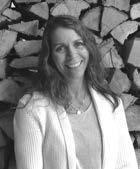










RUSSELL
continued from page 1






Come celebrate summer with us on the Church Street Marketplace!
Enjoy our Music on the Bricks concert series, kid-friendly activities at the Imagination Station , talented acoustic artists , and outdoor shopping all summer long. Plus, our annual Sidewalk Sale is back again for its 44th year!


but still feels there is a lot to learn from both sides.
Russell has been actively involved in town government since he moved to Charlotte in 1995. After a 15-year-long stint on the town’s selectboard — serving 10 of those years as chair — he joined the review board in 2021.
A complaint from Bill Stuono, a newly appointed member of the town’s planning commission, sent earlier this month, outlines eight points against Russell, which range from heckling in meetings and creating hostile relationships with the other town commissions and boards to overuse of outside attorneys and the town’s attorney to justify his points regarding development review board applications.
He also claimed that Russell’s personal biases on a host of issues come through not only in public comments at board meetings but also selectboard and other committee meetings, citing Russell’s involvement with a petition circulated last year to change to a town manager form of government.
“It is vitally important that all town meetings, especially the DRB’s, be a safe and welcoming environment. Rather than show leadership, maintain decorum, make sure his board members are prepared, Mr. Russell has created an atmosphere of dysfunction, and meetings are tense, intimidating, inefficient, and often chaotic,” he wrote. “This cannot continue.”
people are not staying or getting involved in Charlotte because of behavior like this, and I think the town would be best served with a transition to a new person.”
Spreadsheets outlining legal costs for the town over the past three years do not indicate explicitly when the attorney was tapped for specific development review board-related matters. But total attorney’s fees related to zoning and planning, including for “land use regulations,” cost the town $13,600 in fiscal year 2021, $14,420 in 2022 and $9,503 in 2023.
Russell’s
In a written response to the selectboard, Russell responded to all eight of Stuono’s allegations and said that most of the complaints are without evidence and don’t rise to the concern of needing to remove him as board chair.
“Interrupting a speaker every few years at a selectboard meeting or conservation commission meeting is not cause for removal from the DRB,” he wrote. “I acknowledge it is rude, but it is not without precedent. Interruptions happen in small-town government meetings and for the most part, are ignored as part of the colloquial nature of public discussion or are sometimes met with a stern admonishment by the chair.”

churchstreetmarketplace.com/summer Media Sponsor
A written complaint by resident Christina Asquith, who served alongside Russell on the review board for two years, asked selectboard members to take seriously the complaints, saying that from her experience he created an intimidating atmosphere at meetings by dismissing the opinion of other volunteers and working behind the scenes to move applications and land use regulations in one way, which was often “pro-development regardless of facts.”
As far as the allegations regarding interactions with other town committees, he explained that when he attends other meetings, he is offering personal opinions and not an opinion reflected as a member of the review board.




“He leveraged his free time to go to town hall regularly, attend all the meetings, and work behind the scenes, going around and processes in place for the public and public servants,” she wrote. “This was not in the spirit of being an active volunteer — it was to dismantle (land use regulation) language he disagreed with, and sway cases in his preferred direction.”
Additionally, she held similar concern about the “excessive and unnecessary” use of the town attorney and requested that the selectboard do an accounting of the attorney’s billing for the review board.
“Over my time on the DRB, I felt disillusioned,” she wrote. “Too many good
continued from page 12
lay additional eggs in other birds’ nests. This occurs most often in years of plentiful food, such as outbreaks of tent caterpillars, and appears to be a strategy to increase reproductive success by taking advantage of abundant resources. Yellow-billed cuckoos mainly parasitize the nests of blackbilled cuckoos, and vice versa.
Several duck species, including wood ducks, are intraspecific brood parasites, distributing extra eggs in the nests of other ducks of the same species. Through this strategy, they reduce the risk of losing all
“This is my right as a town citizen,” he wrote. “Mr. Stuono does not seem to be familiar with the First Amendment. As a town resident, I have the right to my own opinions on town matters and the right to express and act on those opinions, as does everyone else in town. None of us relinquish those rights when we join a town board.”
He also asserts that the decision to use the town attorney is made by the board at a meeting or by staff.
“I hope you can recognize that there is no substance to the allegations against me. I take great pride in the volunteer work I have done and hope to continue to do for the Town of Charlotte,” he wrote.
At the selectboard meeting last week, Devine said she expects the work with the Vermont League of Cities and Towns to happen over the next several months.
“We’ll reserve the right to take additional action or get additional advice as we see fit,” she said.
their reproductive effort if their own nest is destroyed by a predator.
These fascinating intrigues and deceptions reveal there is more going on in the world of birds than meets the eye.
Susan Shea is a naturalist, writer, and conservationist based in Vermont. Illustration by Adelaide Murphy Tyrol. The Outside Story is assigned and edited by Northern Woodlands magazine and sponsored by the Wellborn Ecology Fund of the New Hampshire Charitable Foundation, nhcf.org.